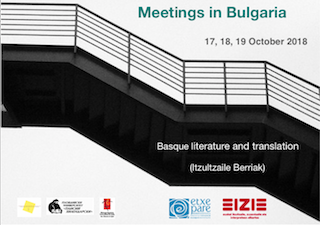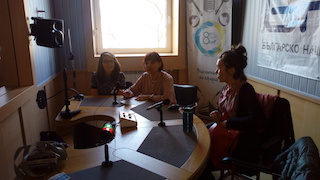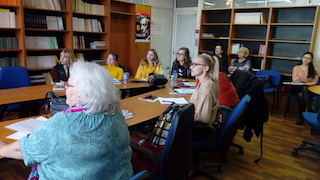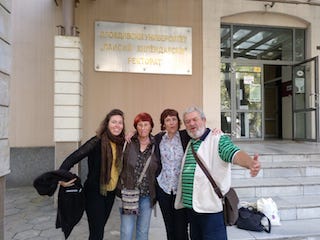Last year representatives from EIZIE (Euskal Itzultzaile, Zuzentzaile eta Interpreteen Elkartea, the Association of Translators, Correctors and Interpreters of the Basque Language) traveled to Slovenia (http://www NULL.eizie NULL.eus/en/Jarduerak/esloveniasolasaldiak) as part of the New Translators (http://www NULL.eizie NULL.eus/en/Jarduerak/itzultzaile_berriak) programme, and this year we were in Bulgaria October 17-19 to discuss the importance of translation in the development of literature and in Basque culture, among other things.
 The three representatives of EIZIE, Garazi Arrula (http://nordanor NULL.eus/nor?id=382&tmp=1538561398172), Elizabete Manterola (http://nordanor NULL.eus/nor?id=343&tmp=1538561377893) and Arantzazu Royo (http://nordanor NULL.eus/nor?id=305&tmp=1538561429876), spent three full days in Bulgaria: two in Sofia and one in Plovdiv. On the first day, October 17, we did a 20-minute interview on Radio Alma Mater (https://www NULL.uni-sofia NULL.bg/index NULL.php/eng/the_university/other_structures/the_su_mass_media/alma_mater_radio) at the Faculty of Journalism at Sofia University. They have a programme once a day, and tune in to a classical music station the rest of the time. According to our interviewer, previous guests on the programme included Basque writers who were there to promote books translated into Bulgarian – to date, a total of six works of Basque literature have been published in Bulgarian. After lunch, we were on National Radio (http://bnr NULL.bg/en) for another short discussion, taking part in Art Efir, a daily radio programme about culture, art, and literature. On both programmes, we spoke about the situation of the Basque language, the evolution of translation, and the import and export of literature, often tying our discussion in with the situation in Bulgaria.
The three representatives of EIZIE, Garazi Arrula (http://nordanor NULL.eus/nor?id=382&tmp=1538561398172), Elizabete Manterola (http://nordanor NULL.eus/nor?id=343&tmp=1538561377893) and Arantzazu Royo (http://nordanor NULL.eus/nor?id=305&tmp=1538561429876), spent three full days in Bulgaria: two in Sofia and one in Plovdiv. On the first day, October 17, we did a 20-minute interview on Radio Alma Mater (https://www NULL.uni-sofia NULL.bg/index NULL.php/eng/the_university/other_structures/the_su_mass_media/alma_mater_radio) at the Faculty of Journalism at Sofia University. They have a programme once a day, and tune in to a classical music station the rest of the time. According to our interviewer, previous guests on the programme included Basque writers who were there to promote books translated into Bulgarian – to date, a total of six works of Basque literature have been published in Bulgarian. After lunch, we were on National Radio (http://bnr NULL.bg/en) for another short discussion, taking part in Art Efir, a daily radio programme about culture, art, and literature. On both programmes, we spoke about the situation of the Basque language, the evolution of translation, and the import and export of literature, often tying our discussion in with the situation in Bulgaria.
On the same day in the afternoon, we were received at the Sofia Literature and Translation House (http://www NULL.npage NULL.org/activities/rubrique93 NULL.html) by director Yana Genova. Translators can work in residence at the house – there is an apartment upstairs – and workshops and conferences are organized. During our visit, they had organized a roundtable about translation from and into Basque that started at 6:30 pm and lasted an hour and a half. The discussion was led by Sofia University (https://www NULL.uni-sofia NULL.bg/eng) Spanish Philology professor Ludmila Ilieva, and there were some twenty-five people in the audience. Perhaps because many of them were professional translators, the attendees showed great interest and asked us about translators’ working conditions, and library networks and access. At the end, we showed a selection from a video of Harkaitz Cano reading his work, Azken aurreko manifestua (https://www NULL.youtube NULL.com/watch?v=DxAMsPk7Aik) (‘The Next-to-the-Last Manifesto’), so that our audience could hear some Basque and because we thought it was appropriate.
For the three events on the first day, Maria Pachkova (http://nordanor NULL.eus/nor?id=1617&tmp=1540893261048) interpreted from Spanish into Bulgarian for us. Two years ago, Maria participated in the New Translators programme. She has translated three works of Basque literature into Bulgarian and is working on another.
The next day, Thursday, we were at Sofia University. At noon we met with Spanish students for an hour and a half, and we had a similar meeting with Spanish students at Plovdiv University (https://uni-plovdiv NULL.bg/en/pages/index/17/) on our last day too. About twenty students came to each meeting, and we spoke about the sociolinguistic situation in the Basque Country, the evolution of translation into Basque, the importance of translation in the development of literature, translation from Basque, and the peculiarities of Basque translation. Maria joined us for these university gatherings as well, even though no interpretation was necessary.
In all of our meetings, we spoke about the work of EIZIE and Etxepare and handed out flyers with information on the two organizations. During these three days, we had the opportunity to meet with people in the profession, not only the instructors who hosted us at the university, but also the professionals, writers and translators who came to our talks. Thanks to this exchange, we learned about Bulgarian literature and translation and their promotion policies, all of which were largely unfamiliar to us –as we noted in our talks, there are no books that have been translated from Bulgarian into Basque. These meetings, which were promoted by EIZIE and Etxepare (http://www NULL.etxepare NULL.eus/en) provided a fruitful point of departure so that our two peoples could meet and lay the foundations for future cooperation. We also saw clearly that it is essential to promote training if we want to export Basque literature.



